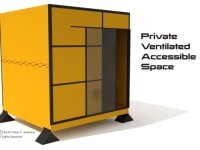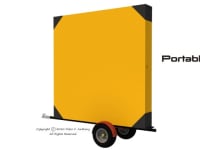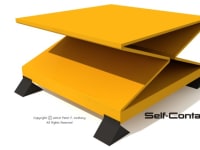About the Design:
The base design concept incorporates a collapsible or folding structure that when collapsed or folded carries a very small footprint for storage and transport and when unfolded provides ample room for four adults secure short term accommodations. The collapsible shelter system is simple, lightweight and portable. Weight was a primary design and development concern so the smallest offering comes in at under 200 lbs utilizing a (patent pending) lightweight composite panel system making assembly quick requiring no more than two people to complete in less than 30 minutes.
Advantages:
First and foremost the collapsible shelter systems primary design function is in separating and elevating the living space from the ground providing a safer, cleaner and drier environment for the occupants who may be living in this small area for more than a year and possibly up to three years. Ground mounted synthetic tents are the most common emergency shelters currently provided to disaster victims worldwide. In some disasters the need is so great that even a simple poly-tarp serves as a shelter. The major problem with these types of shelters is they force the occupants to live directly on the ground in contact unable to avoid the unsafe conditions from pests, floods and excess humidity. By elevating the collapsible shelter system a minimum of nine inches from the ground any environmental threat from ground contact and exposure is eliminated.
Second, everything required to assemble and anchor the collapsible shelter system is self contained within the collapsed unit including the only separate tool necessary…a simple nut driver.
Third, the collapsible shelter system can breathe fresh air allowing ample ventilation to freely flow through entire unit with generous daylight awning windows and sliding access door all provided with insect screening for occupant safety and comfort.
Fourth, it is waterproof. When inclement weather strikes the unit does not leak. The folding hinge design has been engineered to seal the interior surfaces tight and are all sloped to the exterior forcing moisture to flow to the outside. All installed edge channel for the front and rear walls are engineered with a built-in counter drip flash feature which does not allow wind driven water to enter the living space.
Fifth, the shelter system provides comfort in keeping temperatures more stable within as the envelope of the unit is insulated being fabricated from a rigid foam composite core with an thermal resistance value between 6 and 6.5 per inch.
Finally, the shelter system is lightweight and portable making it re-usable and transitional as temporary shelter or housing for longer periods of time. The occupants, because of the durability inherent with composites can use the shelter to live while making the transition to more permanent housing. When the shelter is no longer needed it can easily be collapsed, collected and transported to a storage area being made ready for deployment quickly when the need arises.
Like this entry?
-
About the Entrant
- Name:Peter Anthony
- Type of entry:individual
- Software used for this entry:Sketchup
- Patent status:none








